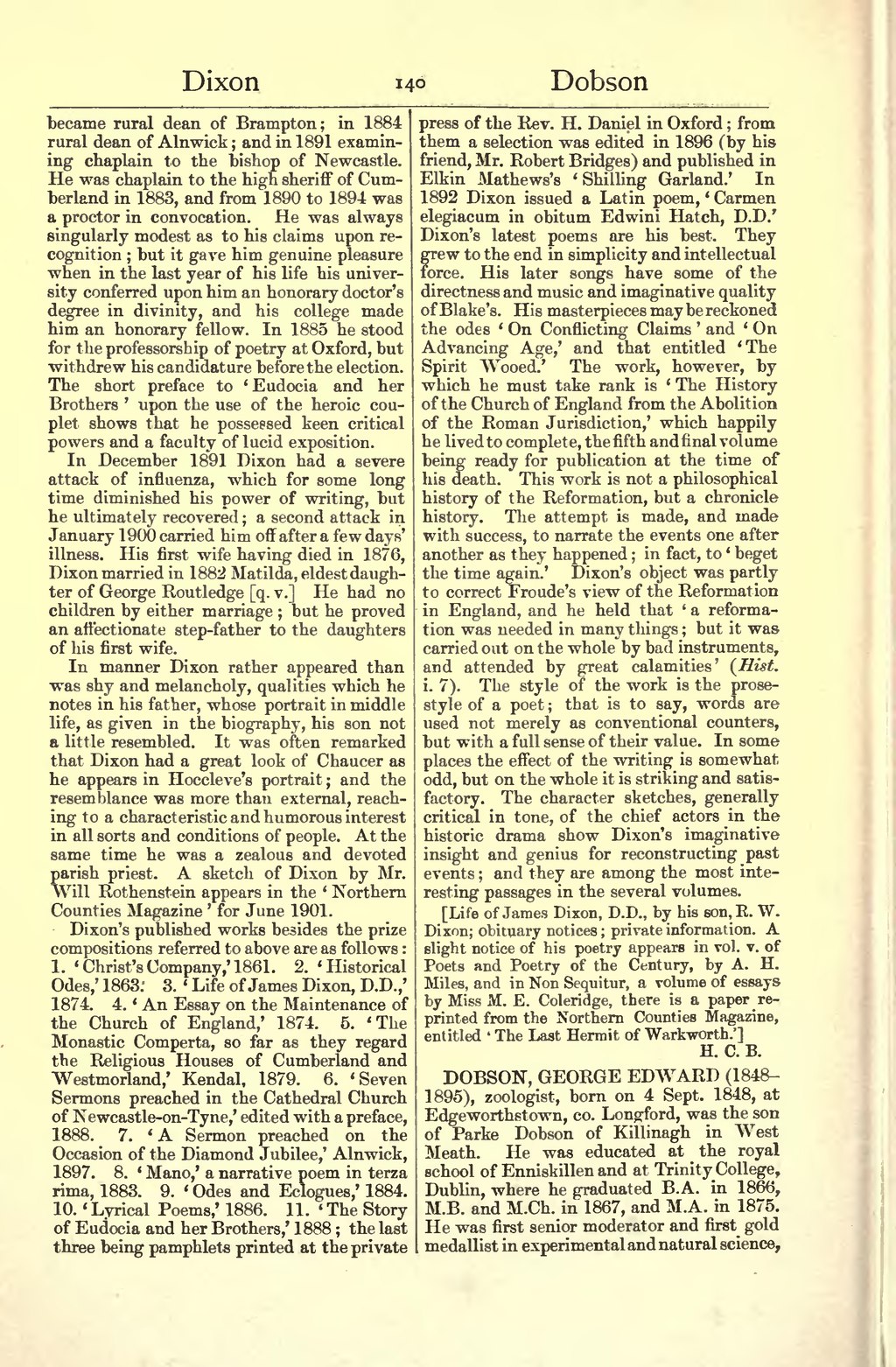became rural dean of Brampton; in 1884 rural dean of Alnwick; and in 1891 examining chaplain to the bishop of Newcastle. He was chaplain to the high sheriff of Cumberland in 1883, and from 1890 to 1894 was a proctor in convocation. He was always singularly modest as to his claims upon recognition; but it gave him genuine pleasure when in the last year of his life his university conferred upon him an honorary doctor's degree in divinity, and his college made him an honorary fellow. In 1885 he stood for the professorship of poetry at Oxford, but withdrew his candidature before the election. The short preface to 'Eudocia and her Brothers' upon the use of the heroic couplet shows that he possessed keen critical powers and a faculty of lucid exposition.
In December 1891 Dixon had a severe attack of influenza, which for some long time diminished his power of writing, but he ultimately recovered; a second attack in January 1900 carried him off after a few days' illness. His first wife having died in 1876, Dixon married in 1882 Matilda, eldest daughter of George Routledge [q. v.] He had no children by either marriage; but he proved an affectionate step-father to the daughters of his first wife.
In manner Dixon rather appeared than was shy and melancholy, qualities which he notes in his father, whose portrait in middle life, as given in the biography, his son not a little resembled. It was often remarked that Dixon had a great look of Chaucer as he appears in Hoccleve's portrait; and the resemblance was more than external, reaching to a characteristic and humorous interest in all sorts and conditions of people. At the same time he was a zealous and devoted parish priest. A sketch of Dixon by Mr. Will Rothenstein appears in the 'Northern Counties Magazine' for June 1901.
Dixon's published works besides the prize compositions referred to above are as follows:
- 'Christ's Company,' 1861.
- 'Historical Odes,' 1863.
- 'Life of James Dixon, D.D.,' 1874.
- 'An Essay on the Maintenance of the Church of England,' 1874.
- 'The Monastic Comperta, so far as they regard the Religious Houses of Cumberland and Westmorland,' Kendal, 1879.
- 'Seven Sermons preached in the Cathedral Church of Newcastle-on-Tyne,' edited with a preface, 1888.
- 'A Sermon preached on the Occasion of the Diamond Jubilee,' Alnwick, 1897.
- 'Mano,' a narrative poem in terza rima, 1883.
- 'Odes and Eclogues,' 1884.
- 'Lyrical Poems,' 1886.
- 'The Story of Eudocia and her Brothers,' 1888; the last three being pamphlets printed at the private press of the Rev. H. Daniel in Oxford; from them a selection was edited in 1896 (by his friend, Mr. Robert Bridges) and published in Elkin Mathews's 'Shilling Garland.'
In 1892 Dixon issued a Latin poem, 'Carmen elegiacum in obitum Edwini Hatch, D.D.' Dixon's latest poems are his best. They grew to the end in simplicity and intellectual force. His later songs have some of the directness and music and imaginative quality of Blake's. His masterpieces may be reckoned the odes 'On Conflicting Claims' and 'On Advancing Age,' and that entitled 'The Spirit Wooed.' The work, however, by which he must take rank is 'The History of the Church of England from the Abolition of the Roman Jurisdiction,' which happily he lived to complete, the fifth and final volume being ready for publication at the time of his death. This work is not a philosophical history of the Reformation, but a chronicle history. The attempt is made, and made with success, to narrate the events one after another as they happened; in fact, to 'beget the time again.' Dixon's object was partly to correct Froude's view of the Reformation in England, and he held that 'a reformation was needed in many things; but it was carried out on the whole by bad instruments, and attended by great calamities' (Hist. i. 7). The style of the work is the prose-style of a poet; that is to say, words are used not merely as conventional counters, but with a full sense of their value. In some places the effect of the writing is somewhat, odd, but on the whole it is striking and satisfactory. The character sketches, generally critical in tone, of the chief actors in the historic drama show Dixon's imaginative insight and genius for reconstructing past events; and they are among the most interesting passages in the several volumes.
[Life of James Dixon, D.D., by his son, E. W. Dixon; obituary notices; private information. A slight notice of his poetry appears in vol. v. of Poets and Poetry of the Century, by A. H. Miles, and in Non Sequitur, a volume of essays by Miss M. E. Coleridge, there is a paper reprinted from the Northern Counties Magazine, entitled ' The Last Hermit of Warkworth.']
DOBSON, GEORGE EDWARD (1848–1895), zoologist, born on 4 Sept. 1848, at Edgeworthstown, co. Longford, was the son of Parke Dobson of Killinagh in West Meath. He was educated at the royal school of Enniskillen and at Trinity College, Dublin, where he graduated B.A. in 1866, M.B. and M.Ch. in 1867, and M.A. in 1875. He was first senior moderator and first gold medallist in experimental and natural science,

